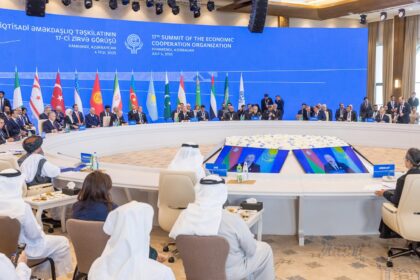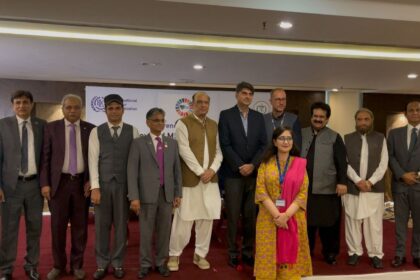KP Finance Advisor Muzammil Aslam Launches Scathing Critique of Federal Policies, Highlights Flood Response and Economic Woes
Islamabad: At a press conference held at Khyber Pakhtunkhwa House in Islamabad, the province’s Finance Advisor, Muzammil Aslam, launched a comprehensive critique of the federal government’s performance, accusing it of economic mismanagement, uneven resource distribution, and neglect of flood-hit regions. He compared the current coalition’s three-and-a-half years in power to the same period given to former prime minister Imran Khan, arguing that while Khan’s government was scrutinized “like no other,” the present rulers, including had been given a free hand despite presiding over economic decline.
Turning to the country’s repeated flood crises, Aslam criticized Bilawal Bhutto-Zardari’s calls for international appeals, agriculture and climate emergencies, and expanded cash support through the Benazir Income Support Programme (BISP). He reminded journalists of past donor pledges, including the Geneva conference in 2022, which he said failed to deliver promised projects. He noted that the finance minister himself had admitted failure to secure even a fraction of the $11 billion pledged.
Aslam accused BISP of failing to produce self-reliance, despite massive allocations of Rs. 700 billion. He cited data showing Punjab received support for 4.6 million households and Sindh for 2.6 million, while resource-starved Khyber Pakhtunkhwa and Balochistan received far less. He urged a review of the program, questioning whether it was lifting families out of poverty or simply creating long-term dependency.
The advisor dismissed the government’s declarations of climate and agriculture emergencies as hollow rhetoric. He noted Pakistan’s forest cover stands at only 4 percent, with KP accounting for nearly half, while other provinces lag far behind. On agriculture, he warned that years of poor management had left Pakistan food insecure, citing the wheat shortage and soaring fertilizer costs. He accused governments of turning farmland into housing societies while failing to build essential flood control and water management infrastructure.
Quoting economist Hafiz Pasha, Aslam warned that growth could fall to zero this year, placing Pakistan among the ten weakest economies globally. He said poverty has already risen from 35 percent of the population in 2022 to a projected 50 percent, equal to 120 million people. “That alone would make Pakistan the 13th largest poor nation in the world,” he remarked.
He criticized the government for nearly doubling national debt from Rs. 43 trillion to Rs. 80 trillion in just three years. He highlighted wheat prices rising 50 percent in a month and accused cartels of manipulating the market to exploit farmers and consumers alike. He added that sugar exports had turned into imports, forcing the government to subsidize mills at the public’s expense.
On the energy front, Aslam claimed Pakistan had paid Rs. 5 trillion in capacity payments to Independent Power Producers (IPPs), equivalent to $50 billion, enough to have built multiple dams. He criticized new oil pipeline agreements that he said would saddle Pakistan with further dollar-denominated liabilities. He also pointed to investment failures, noting that Shanghai Electric abandoned plans to acquire K-Electric after nine years due to lack of cooperation from Pakistani authorities.
Addressing the pending National Finance Commission (NFC) award, Aslam demanded KP’s share be updated from 14.62 percent to 19.8 percent to account for the addition of ex-FATA districts. He accused the federal government of withholding Net Hydel Profit payments, leaving the province underfunded. He argued that Punjab and Sindh had large surpluses but failed to spend on public needs, while KP had managed record development spending of Rs. 153 billion last year and targeted Rs. 250 billion this year.
Contrasting KP’s handling of recent floods with Punjab’s, Aslam said his province delivered the “fastest response in Pakistan’s history.” Within six hours of the floods, he claimed, KP had mobilized relief in 13 districts. Compensation payments totaling Rs. 9 billion were distributed digitally, with families receiving cash directly instead of standing in ration queues. He detailed payments of Rs. 2 million to families of deceased victims, Rs. 500,000 to the injured, and Rs. 100,000 even for homes affected by mud and silt.
Looking ahead, Aslam warned of the looming IMF review and the risk of new taxes to meet a Rs. 1.1 trillion revenue target within two weeks. He dismissed claims of stock market recovery as misleading, saying foreign investors had withdrawn $241 million this year while domestic banks had also sold shares. He questioned why interest rates remained high if inflation was under control and why foreign aid had not materialized if economic reforms were credible.
In closing, Aslam urged Pakistan’s leaders to “spend less time traveling abroad and more time addressing domestic emergencies.” He called for dignity, self-reliance, and a long-term strategy to integrate climate resilience, fiscal responsibility, and food security, warning that without it, Pakistan would remain trapped in recurring cycles of debt, disaster, and dependency.











